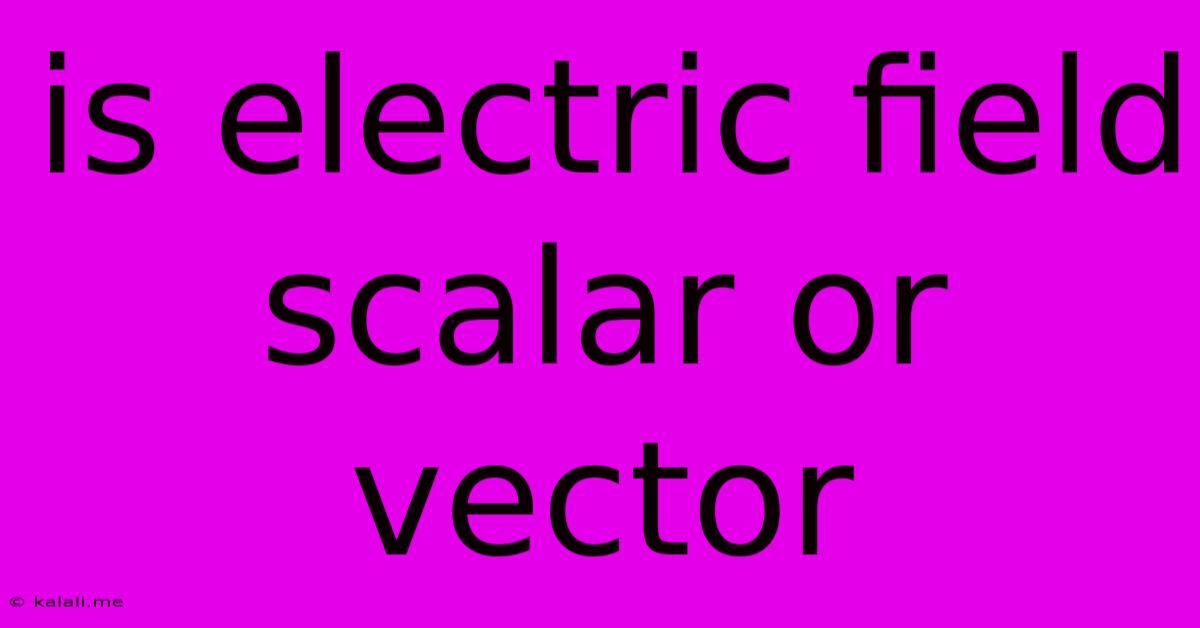Is Electric Field Scalar Or Vector
Kalali
Jun 14, 2025 · 3 min read

Table of Contents
Is Electric Field Scalar or Vector? Understanding the Nature of Electric Fields
The question of whether an electric field is scalar or vector is fundamental to understanding electricity and magnetism. The short answer is: an electric field is a vector field. This means it possesses both magnitude and direction at every point in space. This article will delve deeper into why this is the case, exploring the concepts of scalar and vector quantities and how they relate to electric fields.
Understanding the difference between scalar and vector quantities is crucial. A scalar quantity is fully described by its magnitude alone. Examples include temperature, mass, and speed. A vector quantity, however, requires both magnitude and direction for complete description. Think of displacement, velocity, and force – these all need both a size and a direction to be meaningful.
The electric field, denoted by E, is defined as the force per unit positive charge experienced by a test charge placed at a point in the field. This definition highlights the vector nature of the electric field. Force itself is a vector quantity, possessing both magnitude (strength) and direction. Since the electric field is directly proportional to the force experienced by the charge, it too must be a vector. The direction of the electric field at a given point is the direction of the force that would be exerted on a positive test charge placed at that point.
Visualizing the Electric Field
Imagine placing a positive charge in space. This charge creates an electric field around it. You can visualize this field using electric field lines. These lines emanate outwards from the positive charge, indicating the direction of the force on a positive test charge. The density of these lines represents the strength or magnitude of the field; a higher density indicates a stronger field. This visual representation clearly shows that the electric field has both magnitude (density of lines) and direction (direction of the lines).
Mathematical Representation
The vector nature of the electric field is further emphasized by its mathematical representation. The electric field due to a point charge q at a distance r is given by Coulomb's Law:
E = k * q / r² * r̂
Where:
- E is the electric field vector
- k is Coulomb's constant
- q is the charge creating the field
- r is the distance from the charge
- r̂ is the unit vector pointing radially outwards from the charge.
Notice the presence of the unit vector r̂. This explicitly indicates the direction of the electric field. Without the directional component, the equation would only describe the magnitude of the field, not its full vector nature.
Key Differences: Scalar vs. Vector Electric Potential
It's important not to confuse the electric field with electric potential. Electric potential (V) is a scalar quantity, representing the electric potential energy per unit charge. While related to the electric field, it lacks the directional information inherent in the electric field. The electric field can be derived from the electric potential using the gradient operator, a mathematical operation that extracts directional information.
In conclusion, the electric field is unequivocally a vector field, possessing both magnitude and direction. This fundamental characteristic is essential for understanding its behavior and its interactions with charged particles. The use of vector calculus is crucial for the complete mathematical description and analysis of electric fields and their effects.
Latest Posts
Latest Posts
-
The Basic Structural Unit Of The Nervous System Is The
Jun 14, 2025
-
The Mid Atlantic Ridge Is An Example Of A
Jun 14, 2025
-
A Negatively Charged Ion Is Called A N
Jun 14, 2025
-
In Dna Thymine Always Pairs With
Jun 14, 2025
-
Which Are Not Considered Greenhouse Gases
Jun 14, 2025
Related Post
Thank you for visiting our website which covers about Is Electric Field Scalar Or Vector . We hope the information provided has been useful to you. Feel free to contact us if you have any questions or need further assistance. See you next time and don't miss to bookmark.